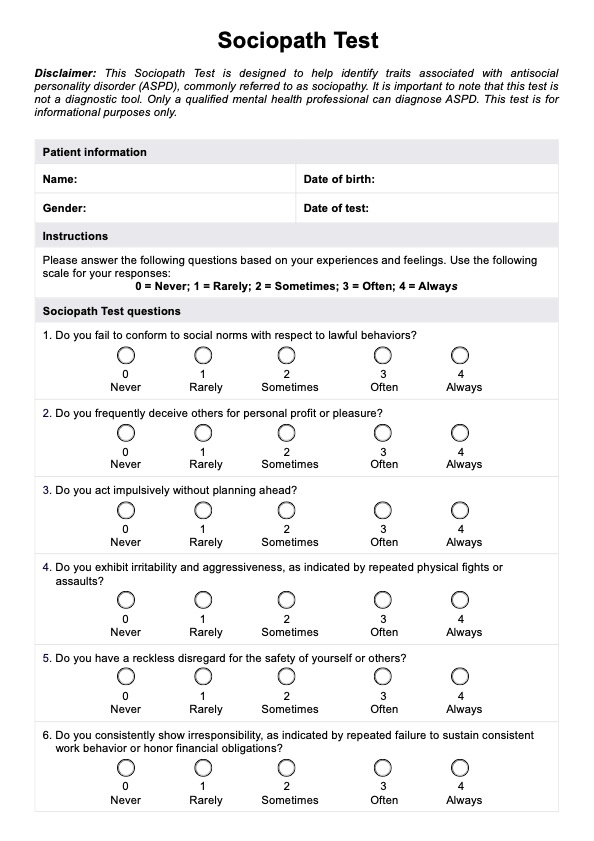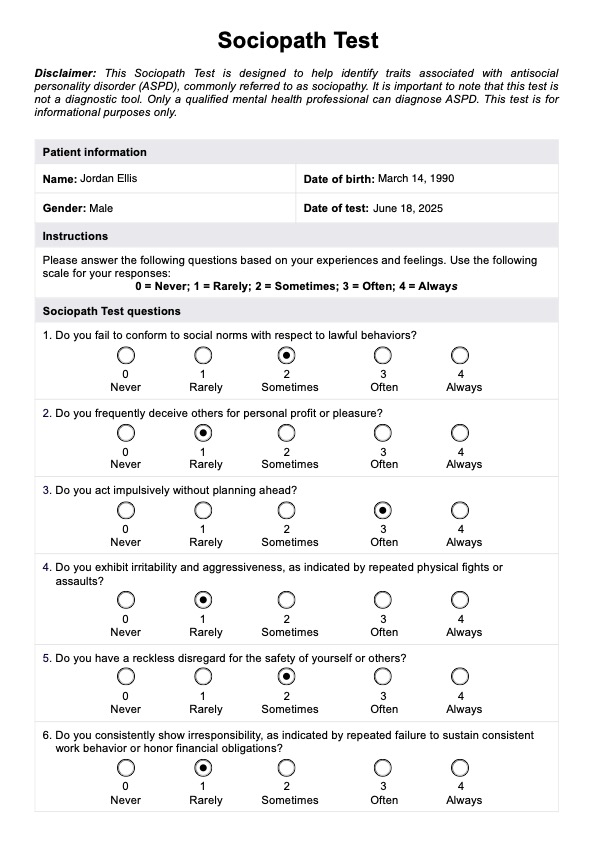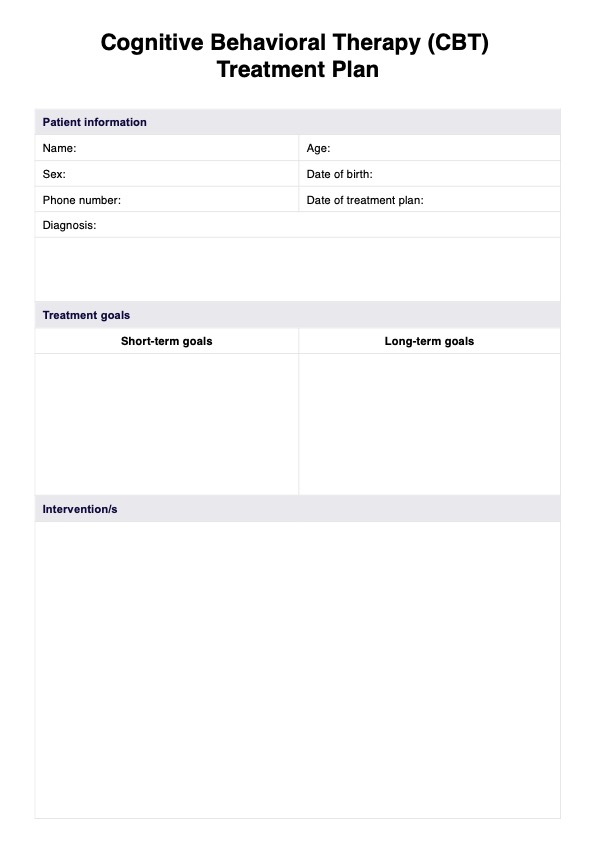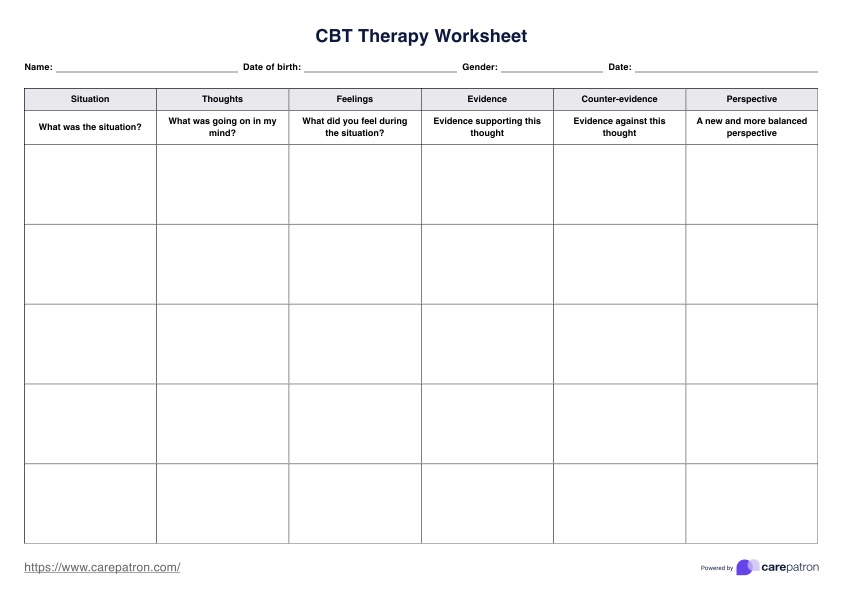Sociopath Test
Explore clients' behavioral patterns with our free Sociopath Test template. Gain insights and start your journey towards self-understanding today.


What is sociopathy?
Sociopathy, more formally known as antisocial personality disorder (ASPD), is a complex mental health condition characterized by a long-term pattern of disregard for, or violation of, the rights of others. Individuals with this disorder often exhibit behaviors against societal norms and laws, leading to significant challenges in interpersonal relationships and society (Skeem et al., 2003).
The condition is marked by a lack of empathy, deceitful behavior, and often a propensity for criminal activity, often for their own benefit. Understanding sociopathy is crucial for recognizing its impact on both individuals and the communities they inhabit.
The Diagnostic and Statistical Manual of Mental Disorders (DSM-5) classifies it as a personality disorder (American Psychiatric Association, 2013). Personality disorders are more than just challenging behavior. They are deep-seated mental health disorders that affect how a person thinks, feels, and interacts with others, leading to significant difficulties in functioning in everyday life.
Sociopath Test Template
Sociopath Test Example
Risk factors of antisocial personality disorder
While the exact causes are not fully understood, researchers have identified several potential risk factors that may increase an individual's vulnerability to developing ASPD. These risk factors can be classified into the following:
- Genetic and biological factors: Individuals with a family history of ASPD or other personality disorders, such as conduct disorder, are at a higher risk of developing the condition. This suggests that a genetic component may be involved in the development of ASPD.
- Brain abnormalities: Some studies have found structural and functional differences in specific brain areas, such as the prefrontal cortex, amygdala, and hippocampus, in individuals with ASPD. These brain regions are involved in decision-making, emotional regulation, and impulse control, which are often impaired in ASPD patients.
- Neurotransmitter imbalances: Imbalances in neurotransmitters, such as serotonin, dopamine, and norepinephrine, have been linked to impulsivity, aggression, and lack of empathy, which are common characteristics of ASPD.
- Childhood trauma: Individuals who have experienced childhood trauma and adverse life experiences such as physical, emotional, or sexual abuse, neglect, or exposure to violence are at an increased risk of developing ASPD.
- Peer influence: Associating with deviant peers or being part of a delinquent social group during childhood and adolescence can reinforce antisocial behaviors and increase the risk of developing ASPD.
- Substance abuse: Substance abuse, particularly during adolescence and early adulthood, has been linked to an increased risk of developing ASPD. Substance abuse may exacerbate impulsivity, aggression, and other antisocial behaviors.
It is important to note that one or more risk factors do not necessarily mean an individual will develop this mental illness. The disorder is likely the result of a complex interplay between genetic, biological, and environmental factors.
What are the signs of sociopathy?
Recognizing the signs of sociopathy is crucial for early intervention and management of the condition. ASPD symptoms manifest through various behavioral patterns that significantly impact an individual's interpersonal relationships and societal functioning.
Here's a more detailed look at the core signs of sociopathy:
Lack of empathy
A defining characteristic of people with sociopathy is they lack empathy or the inability to understand or share the feelings of others. This detachment often results in callousness, anger, and a disregard for the emotions and rights of those around them.
Manipulative behavior
Individuals with sociopathic tendencies frequently engage in manipulative behaviors. They use deceit or repeatedly lie and manipulate to control or exploit others for personal gain, showing little remorse.
Impulsivity
It is common to act impulsively and make hasty decisions without considering the consequences. This impulsivity can manifest in risky behaviors with extremely difficult consequences, sudden changes in life plans, or making large purchases without considering the future.
Disregarding social norms and the law
A blatant disregard for societal rules and norms among human beings, including engaging in behaviors that are grounds for arrest, such as physical fights, is a significant indicator of sociopathy. This disregard may lead to a history of criminal behavior or legal troubles.
Difficulty forming emotional connections
Despite often being charming and engaging on the surface, people diagnosed with ASPD typically struggle to form deep, genuine emotional connections with others, even among family members. Relationships may be superficial and primarily serve the sociopath's interests.
Aggressiveness or irritability
Many people dealing with sociopathy tend to exhibit aggressive behaviors or become easily irritated. This can lead to physical altercations or verbal abuse directed at those around them. These are often observed starting within the teen years.
Lack of responsibility
There is often a failure to sustain consistent work behavior or honor financial obligations. Sociopaths may frequently evade difficult situations, change jobs, default on debts, or rely on others for financial support without reciprocation.
Inability to feel guilty or learn from mistakes
A lack of guilt or remorse for actions that harm others is a core feature of sociopathy. This includes an apparent indifference to having hurt, mistreated, or stolen from another person.
Recognizing these signs is pivotal in addressing sociopathy and mental disorders. It's important to note that these behaviors must be a consistent pattern over time, not isolated incidents, to suggest sociopathy. If you or someone you know exhibits these signs, seeking evaluation from a licensed mental health professional is a critical step toward understanding and managing the condition.
How does this Sociopath Test work?
The Sociopath Test is a tool designed to help identify potential sociopathic tendencies. While not a definitive clinical diagnosis, it can provide insights into behaviors and thought patterns associated with sociopathy. When administering this test to assess for ASPD or sociopathic tendencies, healthcare professionals can follow these steps:
Step 1: Introduction and informed consent
Explain the purpose of the assessment to the client and obtain their informed consent. Provide an overview of the process, addressing any concerns or questions they may have.
Step 2: Administer the test
Administer this Sociopath Test to the client. Follow the standardized instructions provided by the test and let the clients answer the questions based on their experiences and feelings.
Step 3: Score and interpret
Based on the clients ' responses, score the ten items on a 5-point scale (0, 1, 2, 3, 4). Total scores range from 0 to 40, with higher scores indicating a greater likelihood of sociopathic traits.
Step 4: Integrate additional information
Review collateral information from family members, friends, or other sources who have interacted with the client. Consider the client's history, behavior patterns, and other relevant clinical observations.
Step 5: Interpretation and diagnosis
Interpret the test results in conjunction with the diagnostic criteria outlined in the Diagnostic and Statistical Manual of Mental Disorders (DSM-5) for ASPD and other sources of information. Evaluate the presence and severity of symptoms, considering the client's overall functioning and potential comorbidities.
Step 6: Consider next steps
If the assessment results suggest the presence of significant sociopathic tendencies, discuss the findings with the client in a sensitive and non-judgmental manner. Explain the implications of the diagnosis and the potential need for further evaluation or treatment. This can be followed by developing a treatment plan, including psychotherapy (e.g., Cognitive-Behavioral Therapy), medication management for co-occurring conditions, or referrals to other relevant services.
If the results do not indicate ASPD, explore other potential underlying issues or mental health conditions that may be contributing to the client's presenting concerns.
How do you interpret the results of this test?
Interpreting the results of the Sociopath Test requires caution. High scores may indicate the presence of traits associated with sociopathy, but they do not confirm a diagnosis.
- 0-10: Low likelihood of sociopathic traits
- 11-20: Some sociopathic traits present
- 21-30: Moderate number of sociopathic traits present
- 31-40: High likelihood of sociopathic traits
It's essential to consult with a mental health professional for a comprehensive assessment and accurate diagnosis. The test results can be a starting point for discussions with a therapist or doctor.
What are the benefits of taking this Sociopath Test?
Taking a Sociopath Test can be a transformative experience with numerous benefits, both for individuals questioning their behaviors and those around them. While not a diagnostic tool, this test can illuminate patterns and tendencies that may require attention. Here are some of the key advantages of engaging with this type of assessment:
Enhanced self-awareness
The primary benefit of taking a Sociopath Test is the significant increase in self-awareness it can foster. Individuals gain insights into their behavioral patterns by answering questions that probe various aspects of empathy, social interactions, and moral judgments. This heightened awareness is the first step towards understanding the complexities of one's actions and their impact on others.
Early detection and intervention
Early detection of sociopathic tendencies is crucial to plan. The Sociopath Test can help identify these tendencies before they manifest into more severe antisocial behaviors or lead to negative consequences. Recognizing signs and life experiences common to diagnosed individuals helps clients seek professional help sooner, potentially mitigating the more harmful aspects of the disorder.
Facilitation of professional help
Taking the test and acknowledging the results can be a powerful motivator for seeking professional help. It is a tangible acknowledgment that underlying mental health issues may be worth exploring with a licensed mental health professional. This step is vital for anyone who finds their behaviors aligning with sociopathic tendencies, as professional guidance is essential in navigating the complexities of antisocial personality disorder.
Improved relationships and social interactions
Understanding one's behaviors and how they affect people's emotions and others can improve relationships and social interactions. By becoming aware of sociopathic tendencies, individuals can work towards modifying behaviors that negatively impact their relationships. This can lead to more meaningful connections, better communication, and a more empathetic approach to interactions with others.
References
American Psychiatric Association. (2013). Diagnostic and statistical manual of mental disorders (5th ed.). Pearson.
Skeem, J. L., Poythress, N., Edens, J. F., Lilienfeld, S. O., & Cale, E. M. (2003). Psychopathic personality or personalities? Exploring potential variants of psychopathy and their implications for risk assessment. Aggression and Violent Behavior, 8(5), 513–546. https://doi.org/10.1016/S1359-1789(02)00098-8
Commonly asked questions
Antisocial personality disorder (ASPD) is a complex condition, and there's no cure. However, treatment with a mental health professional can significantly improve an individual's ability to manage symptoms. Therapy can teach them coping mechanisms, communication skills, and how to take responsibility for their actions. Medication might address co-occurring issues like bipolar disorder or depression. Success depends on the person's willingness to participate in treatment and their support system.
Generally, people with antisocial personality disorder (ASPD) struggle with empathy. They may have difficulty understanding or caring about the feelings of others. This can make it challenging for them to form healthy relationships and may lead to manipulative or hurtful behavior.
Antisocial personality disorder (ASPD) or sociopathy is a personality disorder characterized by a pervasive pattern of disregard for the rights of others, lack of empathy, and engaging in antisocial behaviors. It differs from other mental disorders, such as bipolar disorder or depression, which primarily involve mood disturbances. Antisocial personality disorder (ASPD) is also distinct from conditions like psychopathy, which involves additional traits like superficial charm and a complete lack of remorse.

.jpg)























-template.jpg)






















































































